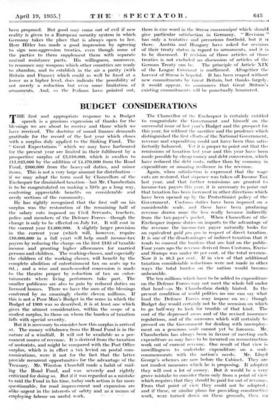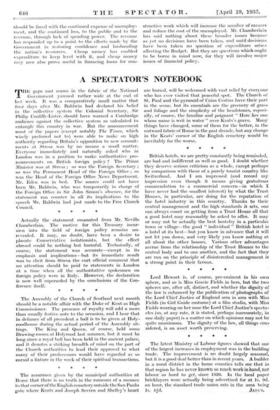BUDGET CONSIDERATIONS T HE 'first and appropriate response to a Budget
:Speech is a gracious expression of thanks for the blessings we are about to receive and those which we have received. The doctrine of sound finance demands gratitude for the record of the last year which closes with 'a Surplus duly applied to the Sinking Fund. The " Great Expectations " which we may have harboured for the present year are limited in their fulfilment by a prospective surplus of £5,610,000, which is swollen to 111,025,000 by the addition of £4,470;000 from the Road Fund, '1800,000 from the heavy-oil duties, and minor items This is nota very large amount for distribution— if we 'may adopt the term used by Chancellors of the Exchequer for diminished taxation—but Mr. Chamberlain is to- he congratulated on making a little go a long way, conferring appreciable benefits on considerable and needy sections of the community.
He has rightly recognized that the first call on his surplus was the restoration of the remaining half of the salary cuts imposed on Civil Servants, teachers, police and members of the Defence Forces—though the change is only to be effected on July 1st. It will cost in the current year £4,000,000. A slightly larger provision in -the-. current year (which will, however, require £10,000,000 in a full year) will help small income-tax payers by reducing the charge on the first £135 of taxable income and granting higher allowances for married persons and children. The working-classes, and especially the children of the working classes, will benefit by the complete abolition of entertainment tax on seats up to 6d. ; and a wise and much-needed concession is made to the theatre proper by reduction of tax on enter- tainments where living performers take part. The smaller publicans are also to gain by reduced duties on licensed houses. There we have the sum of the blessings conferred by an amazingly elastic eleven millions. If this is not a Poor Man's Budget in the sense in which the Budget of 1909 was so described, it is at least one which gives the utmost consideration, within the scope of a modest surplus, to those on whom the burden of taxation falls with special severity.
But it is necessary to consider how this surplus is arrived at. The money withdrawn from the Road Fund is in the nature of 'a windfall. It will not be available as a per- manent source of revenue; It is derived from the taxation of motorists, and might be compared with the Post Office surplus; which is in effect a tax levied on postal com- munications, were it not for the fact that the latter provide recurrent- opportunities for the advantage of the Treasury. 'Mr. Winston Churchill made a habit of raid.- ing- the Road Fund, and was severely and rightly criticized-for doing so. But if it was regarded as a Mistake to raid the Fund in his time, todaysuch action is far more questionable; for road improvement and expansion are alike ,urgent in the interests-of safety and as a means of employing-.labour - on useful work: The Chancellor of the Exchequer is certainly entitled to congratulate the Government and himself on the successful issue of last year's Budget and the prospect for this year, for without the sacrifice and the prudence which distinguished the first efforts of the National Government, revenue and expenditure could not have been thus satis- factorily balanced. Yet it is proper to point out that the remissions of taxation last year and this year have been made possible by cheap money and debt conversion, which have reduced the debt costs, rather than by economy in expenditure Or amazing resilience in the revenue.
Again, 'when satisfaction is expressed that the wage cuts are restored, that sixpence was taken off Income Tax last year, and _that further remissions are granted to income-tax payers this year, it is necessary to point out that taxation has been increased in other directions which have been opened up by the Protectionist policy of the Government. Customs duties have been imposed on a 'considerable scale, and these have been producing revenue drawn none the less, really because indirectly from the tax-payer's pocket. When Chancellors of the Exchequer impose duties on imports to the advantage of the revenue the income-tax payer naturally looks for an equivalent quid pro quo in respect of direct taxation. It is one of the disadvantages of indirect taxation that it tends to conceal the burdens that are laid on the public. Four years ago the revenue derived from Customs, Excise and Stamps was under 39 per cent. of the total revenue. Now it is 46.5 per cent. If in view of that additional taxation considerable reductions were not made in other ways the total burden on the nation would becOme unbearable.
- The ten millions which have to be added to expenditure on the Defence Forces may not meet the whole bill under that head—as Mr. Chamberlain darkly hinted. In the present condition of world politics no one can say what load the Defence Forces may impose on us ; though Budget day would certainly not be the occasion on which to go half-way to look for trouble of that kind. The cost' of the depressed areas and of the revised insurance regulations,- and of the measures which will certainly be 'pressed on the Government for dealing with unemploy- ment on a generous scale cannot yet be foreseen. Mr. Chainberlain has always been in favour of meeting such expenditure as may have to be incurred on reconstruction 'work out of current revenue. One result of that view is unwillingness to undertake expenditure on a scale commensurate with the nation's needs. - Mr. Lloyd George's schemes are now before the Cabinet. They are not modest "measures which he is proposing. - If adopted they will cost a lot of money: But it would be a very grave mistake to consider them only from a point of view which requires that they should be paid for out of revenue. From that' point of view they could not be adopted ; and if these, or similar plans for providing constructive Work, were tattled dowii on these grounds, then VW should be faced with the continued expense of unemploy- ment, and the continued loss, to the public and to the revenue, through lack of spending power. The revenue has responded up to a point to the efforts made by the Government in restoring confidence and husbanding the nation's resources. Cheap money has enabled expenditure to keep level with it, and cheap money may now also prove useful in financing loans for con- structive work which will increase the number of earners and reduce the cost of the unemployed. Mr. Chamberlain has said nothing about these broader issues because as yet no decisions, have been taken, and until decisions have been taken no question of expenditure arises affecting the Budget. But they are questions which ought to be borne in mind now, for they will involve major issues of financial policy.







































 Previous page
Previous page